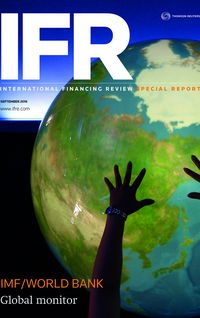While progress has been made, there are still many hurdles to overcome before a mutually acceptable resolution is reached on Greece’s situation.
The International Monetary Fund’s relationship with its major debtor Greece remains in an uncertain position, after a compromise was thrashed out in May to allow the second tranche, €10.3bn, of the country’s current bailout programme to be released.
That money is only coming from Greece’s eurozone partners, via the European Stability Mechanism. Unlike in Greece’s two previous programmes, the IMF has not yet pledged loans as part of the current €86bn deal.
“The programme has to walk on two legs. One, there has to be significant reforms and, second, there has to be a debt that is sustainable by our standards,” said Christine Lagarde, managing director of the IMF, in early September. “At this point in time [this] is not the case.”
The fund has insisted that debt relief be granted to Greece to make its debt sustainable and so give the programme a better chance of success. That had been resisted by the eurozone finance ministers, reluctant to admit to their electorates that not all their money will be repaid.
But May’s deal saw ministers agree to study in more detail a range of options to give Greece debt relief at the end of the current programme in 2018.
And on its side, IMF representatives at the eurogroup meeting indicated the fund would be willing to join the programme, even on this basis. It had previously said it would only do so if debt relief was explicitly granted up front.
“I believe we have made a major concession,” said Poul Thomsen, director of the IMF’s European department, in May. “We had argued that these debt relief measures should be approved upfront and we have agreed that they will be approved at the end of the programme period.”
He said it was important that eurozone ministers had also accepted that Greek debt was unsustainable and needed debt relief to make it so.
An IMF official explained the conundrum. “If Greece sticks to the programme it will get the debt relief that in our view is needed, so that by the end of the programme period we can all conclude that debt is sustainable and Greece should be able to restore market access.
“If Greece doesn’t implement the programme and doesn’t get the debt relief, obviously, the debt is not sustainable. But even if Greece gets the debt relief unconditionally up front, debt will not be sustainable by the end of the programme if policies are not implemented. Everything is always contingent.”
At the time, IMF staff pledged to look at the raft of possible measures “to make sure that, based on a revised debt sustainability analysis [DSA], they will deliver the necessary debt relief” before seeking approval from the IMF board to join the programme.
There have been indications that board approval could be reached by the end of this year. But, so far, no more precise timing has been given, leaving the situation in the balance as to whether the IMF will actually loan more money to Greece.
Instead, the IMF has confirmed that a mission will go to Greece to conduct a standard Article IV review of the economy. All IMF countries receive such annual visits, but Greece has not had one for over three years because of its exceptional circumstances.
“This will cover the macroeconomic outlook, policies and prospects for the Greek economy,” said an IMF spokesperson. “It’s an opportunity to step back from the immediate issues and discuss broader challenges. These will feed into discussions down the road about possible IMF participation in the programme.”
Since May, the IMF had had “no additional discussion on debt relief with other European institutions”, said the spokesperson adding that these were “expected to be conducted in coming months”.
Progress?
It is hardly surprising the IMF has made this stand. Last year, Greece failed to make a payment to the IMF, the first time a country in a programme had defaulted on the international lender of last resort. That was swiftly made good but, since then, the Fund has indicated it would prefer the eurozone to fund its own member’s needs alone and instead take on a monitoring role.
Greece has already received €7.5bn of the €10.3bn pledged in May and is hoping to received the remaining €2.8bn in the coming months. Sentiment has improved towards the country, and particularly its banks, since the agreement with the eurozone in May too.
“Greece is on a slow path to recovery. They have undertaken a lot of reforms, including on pensions, on tax collection and the new ambitious constitutional reform,” said Alberto Gallo, head of macro strategies at hedge fund Algebris.
“They should also have pretty good tax revenues in the summer and we are looking at an inclusion in the ECB QE programme by year-end,” he said.
The banks have made positive steps too. People opening new bank accounts will not be subject to capital controls which affect existing accounts either. The controls were introduced after €120bn – or half of all deposits – were withdrawn before the latest bailout was agreed in July 2015.
“You need several steps to reduce capital controls,” George Poulopoulos, acting CEO of Piraeus Bank, told IFR. “A first step is that we need to incentivise people to bring back their money, and we are discussing the idea of ‘new money’ accounts that can have withdrawals at any time, that aren’t subject to controls.”
However, the banks are still reliant on central bank funding, with about €100bn outstanding. The bond market remains closed, for now.
“Markets have short memories, but it’s going to be late 2017 at the earliest before we see banks back in the market,” said a board member of one of the banks. “First we need to see the sovereign rebuild its yield curve, then the banks can build on that.”
The banks are also still beleaguered by €110bn of non-performing loans, which have so far proved unattractive to third-party potential buyers.
“We see very limited transactions in terms of bad loan sales, and expect the vast majority of NPL reduction will come through curing,” said Poulopoulos. “The bid-offer spread is just too wide, especially on secured credit. Hopefully, it will close as the economy improves.”
That view was shared by the CFO of a second Greek bank. “We aren’t yet in a position to talk about firm deals with regard to bad loan sales, and in fact in the near term I am very pessimistic on the prospect of NPL sales,” he said.
Bosses at the banks say that interest from international investors in the weeks since laws were redrafted has been low and that bids fall far short of the banks’ expectations. Selling at such prices, which are also below the 50% provisions made by banks, would mean deep losses and hits to capital.
Sustainable?
Much will still depend on the outcome of the IMF’s forthcoming debt analysis. Besides asking for Greek debt relief upfront, the fund has also insisted that the eurozone drop its stiff requirement that Greece make an annual primary surplus of 3.5% of GDP and instead use a more realistic target of 1.5%.
“It’s easy to be sceptical but there was progress [in May]. Germany came around to accepting debt relief and the programme is carrying on, probably with the IMF. But it still looks like a big can-kick,” said Gabriel Sterne, head of global macro research at Oxford Economics.
Others are less positive.
“The IMF’s position remains the same as that expressed in May, when the first review of the bailout was agreed and European creditors made some small steps forward in committing to deliver some debt relief on the Greek debt,” said Giada Gianni, an economist at Citigroup.
“More concreteness on these measures is needed for the IMF to be able to assess Greek debt sustainability positively and to participate financially in the bailout. We doubt this could be agreed in the near term, or by the end of the year as initially envisaged.”
To see the digital version of this special report, please click here
To purchase printed copies or a PDF of this report, please email gloria.balbastro@tr.com



